This minister’s passion for a school changed many lives.
The Story Of The Downing Industrial School
by Reverend J.M. Shofner
Brewton, Alabama
1919
While pastor of the church in Tallassee, in an effort to help the girls who had no opportunity, I taught a night school, and the earnest seekers after knowledge were so delighted that soon the room was crowded and there was no chance to meet the growing demands. I have often been to the homes of such girls as could not read to teach them the Sunday school lesson so that they would not be embarrassed in their class Sunday morning.
Several students on the campus of the Downing Industrial School Girls in Brewton, Alabama (Alabama Department of Archives and History)
A need for a school for girls of limited means
As I was nearing my fourth year in this room in this town my desire grew for a school with industrial features, by which girls of limited means could make their expenses, or part of them, by work. In the discussion at the beginning the ideas and purposes which I set forth met with considerable favor. Miss Mary Lou Martin was one of the first with whom I talked over a school crudely outlined thus: To have a home governed by a competent matron in which all the girls should have an equal share in the duties pertaining to the kitchen, dining room, housekeeping, ect., in this way defraying part of their expenses, and receiving good training–physically, mentally, and spiritually. In the meantime a truck farm, a dairy and a cannery were to be operated, from which the home would be supplied with the necessities and even luxuries of life.
Some day it will be
I wanted Miss Martin’s* opinion, for I knew her to be a woman reserved and modest, when giving expressions to thought, of deep piety, decided convictions, correct judgment, and strong in faith. After listening patiently to me elaborate my ideas, she modestly but firmly said “That ought to be, and some day it will be.” Little did we dream at that time that the school would someday became a reality and within twelve years reach its present proportions, and that she would be one of the most potent influences in guiding the young life and shaping the destiny of the hundreds of girls who should crowd the halls.
Esther home – first dormitory at Downing Industrial School for Girls
Sketch of Pauline Taylor Hall at the Downing Industrial School for Girls in Brewton, Alabama, and of Dr. J. M. Shofner, the school’s founder
It is noble, but you can not do it
When I laid the matter before my presiding elder he said, “It is a noble thought in you, but you can not do it.” He also said, “I believe in higher education.” I answered, “I also believe in higher education, but how can you get the higher if you have not the lower?” But this remark on his part caused me to drop the matter for a time. At the ensuing session of the conference I was sent to Brewton, and after a short time the old desires were rekindled and continued with me until I reached a clear conviction that I ought to do the work. Then I began publishing in the papers my plans and purposes, which brought about various comments and criticisms.
He did not think the plan feasible
Dr. J.M. Mason was my presiding elder at this time, and while he did not oppose me, he did not think the plan was feasible. Neither did most of the brethen. There were some, however, who sincerely believed that the plan well executed would result in good. Among this number were Bishops Wilson, Duncan, Morrison, Key, Granberry, who wrote me unqualified endorsements and encouraged me greatly in the work. I appreciate these endorsements from our good bishops, for there are those among us, even among the preachers, who have come from the low walks of life, who have been promoted to higher stations, yet who seem to overlook some of the most worthy, as well as the most needy objects of educational work.
String quartet of Downing Industrial School
First gift was made for school
It was in May, 1904, my first year in Brewton, that the first gift was made by Miss Martha Vincent, of Rehoboth. The next donation came from Miss Grace Dodge, of New York. Soon other amounts followed and by fall we purchased the site of Old Fort Carwford, (sic) one mile east of Brewton.
I began with no organization
At this stage there were so few who endorsed the plan that rather than be delayed and possibly defeated in the work, I began with no organization. This may have not been wise, but I get so impatient with some people’s discussing, debating, resolving, dictating, but never doing anything. So I began all alone and it is perfectly wonderful how the people contributed to this cause when I only was responsible.
Because of many difficulties, the work progressed slow but surely, and it was July 2, 1906, before we organized and incorperated (sic) in the name of the Downing Educational Society, but the institution was called the Downing Industrial School, in honor of Mr. E. Downing, who has been quite liberal in building churches and school house and assisting many in their education.
C. L. Wiggins Hall at Downing Industrial School in Brewton, Alabama
It was a difficult matter to push the work to success with the demands of my pastorate and to answer the questions of those who did not think the plan fessible.(sic)
Honored with confidence and sympathy
To offset this, however, I was honored with confidence and expressions of sympathy, and many contributed largely out of sympathy for the work rather than confidence in its ultimate success. So after hard efforts, painful delays, and deep heart yearnings, we erected in 1906 our first building, the Esther Home. This was named in honor of Mrs. Esther Downing, whose contribution of $1,000 made this building possible.
On the 24th of September we opened the doors and nine girls matriculated. Mrs. Fannie Cobb was our first matron and the teachers were Misses Mary Lisle, Annie Dowman and Mamie Johnson, who boarded at the dormitory and taught our girls in the East Brewton High School.
Downing industrial school young men and women
To leave my school was the greatest trial I experienced
I was closing my third year as pastor of the Brewton church, and I wished very much to return the fourth year and get the school on a more solid basis, but at the unsueing (sic) conference held at Eufaula I was sent to Enterprise by Bishop W.W. Duncan. While this was decidedly the best appointment I had ever received, to leave my school was the greatest trial I had experienced. Some of the brethren wanted my appointment changed after conference so that I might be permitted to remain at Brewton, but I could not agree to this. Believing that every man should be loyal to the cause which he espouses, I went to Enterprise, though with a broken heart. The unbounded hospitality of the people and the unceasing manifestations of their appreciation of me were enough to estrange a man ordinarily from former ties,but I was distressed for the little school I had left at Brewton, which was my oncarnate (sic) life.
There was a wondeful (sic) Providence in all this and I submitted to the leading of the Hand which I could not see. I was determined to wait patiently for the unfolding of his purpose by crystallizing a faith that could not die.
Faith was materialized
This faith was materialized when Mrs. Martha Sawyer Gielow, of Greensborro, invited me to come and see her and directed to the school $5,000.00 which had been contributed to the Southern Industrial Education Association,Washington City. This with about $2,500.00 which the people of Brewton promised seemed to be a further indication of God’s approval of the work.
During the year at Enterprise the school was still in progress and the matron and teachers held things together so beautifully that it seemed almost useless for me to return. But at the next conference, though there was opposition, I was sent back to Brewton and the good bishop and cabinet were very kind when they agreed for me to carry on the school in connection with my pastoral work.
Erected Pauline Taylor Hall
In 1908 we erected the Pauline Taylor Hall, our administration building, which is a memorial for Miss Pauline Taylor, sister of Miss Cornelis Aiken Taylor, who gave the $5,000.00.
The next year I was taken out of regular pastorate and appointed to the school. This was by my own consent, yet it worked a hardship on me, for in moving to the school we were forced to live a camp life for awhile. Later on we built a home for the president. During the next four years there were continual improvements, such as enlarging the buildings, installing water and lights, and erecting a handsome brick building of thirty-two rooms. This last was named in honor of Mrs. Martha Sawyer Gielow, who had shown her friendship many times in a substantial way.
There must have been a guiding Providence, as is seen from a few of the many facts connected with the history of the school. When I was appointed to the church at Enterprise, leaving the school in charge of the matron and teachers, with so little income and so little assurance of its future — it was at this critical time that the $5,000.00 came to me from the Southern Industrial Association in Washington City and the $2,500.00 from Brewton.
Laboring under a huge debt
Again in 1909 when I was laboring under the weight of a $5,000.00 debt and expenses much in excess of the income, after much anzious (sic) worry and perplexity, there came to us $10,000.00 from the bequest of Mr. C.L. Wiggins.
In 1915 we were called upon to pass through the most severe financial crisis of all. Contributions had ceased to come and a final closing out of business seemed positively inevitable. Again, there came to us a bequest of $13,919.29 from Miss Cornelia Aiken Taylor, of New York.
At the launching of the enterprise my great desire was that the church would take up the work, and I made repeated efforts to this end. I first asked the good women of the church of Brewton to take it up and make it a local institution. I then tried to get the Woman’s Home Mission Society of the Alabama Conference, then the Woman’s General Board through Miss Belle Bennett to adopt it. After this the matter was considered by the Pensacola District Conference of the M.E. Church, South, but all with one consent positively refused to take it up or have anything to do with it. So, after our organization July 2, 1905, we were an independent school until December, 1912, when it was tendered to, and accepted by, the Alabama Conference of the M.E. Church, South. The words used in tendering it were, “Take this child of tender years and nourish it.”
Some objections to the school
There were some objections to the school’s being tendered the Alabama Conference, but while many other denominations had contributed liberally, there had not been any promise that it should not become a church enterprise. It was not a denoinational (sic) feature, however, in me when I insisted on its belonging to the church, but I wanted it distictively (sic) Christian. I have never liked the idea of the independent, self-governing, irresponsible man or organization. I felt that to insure its permanency one of three things was necessary: that the State should own it; that the church should own it; or that it must adequately endowed. Of the three I thought the church should be back of the institution, giving it Christian influence, power, and perpetuty. (sic) however, there is no sectarian spirit whatever in the school, as each pupil is not only allowed the freedom of her faith, but encouraged to be loyal to her profession.
Now, from the time of the opening of the school, 1906, to December, 1912, this school was a child without a home, whether of legitimate origin is for men to decide; but it was homeless, hungry, and begging for someone to whom to look and fell a father’s and mother’s sympathy and care; a place to which to go and feel at home until December, 1912, when the Alabama Conference accepted it. Now, unlike every other institution of the church, it has not yet any definite way of support. Yet is has lived and progressed to the astonishment of a great many of its friends.
Spared no pains soliciting help
I have spared neither pains not time in soliciting help for my school. While gathering help from the poor, I have sought in every imaginable way donations from the rich. If I could hear of any person from whom a possible contribution could be secured, I would write that person and get others to write, and this I did repeatedly. In all of these efforts I am sure I have been guilty of doing some foolish things; for in my own State I have gone day and night, suffering all kinds of privations, hunting down generous persons, and have often returned to my home sick with disappointment, as well as worn out in the chase. In the North I have tried from every from standpoint to get in touch with the philanthropists, but could scarcely ever get nearer than the third or fourth secretary, who would explain that the system could allow the entertainment of no new plan for placing money.
The school has grown in nine years from our first dormitory with nine girls, a matron, three teachers and a plant worth $5,000.00 to three dormitories, an administration building, president’s home, two farm houses, and an enrollment of 173 pupils, a faculty of fourteen and a plant valued at about $60,000.00.
One girl expressed her gratitude
Permit me here to tell you of one girl who is worth every effort of heart, mind and body that has ever been spent in this institution even if she had been the only one who has ever been helped. She came to us in the summer of 1910 and made the very best use of her time through every session until her graduation. When I had secured a scholarship for her, her widowed mother, by hard effort, economy and self-denial, made enough to pay for her books, clothes, ect. Because of her wonderful resources and peculiar adaptability, I immediately employed her as one of our teachers when she finished school here.
During the next vacation she wrote me and I give a quotation from her letter: “No one can ever know how much I appreciate your help to me. I thank God daily for such a man as you are, for I feel that to you is due the praise for my success. Be assured that I shall do my best in the work I am to do for you.” This young lady is still teaching for us and carrying into effect all she promised and all we expected. She has incarnated the fundamental principles upon which our school is established, and she will imortalize (sic) the purpose of the institution from which she was graduated and which she serves with sincere devotion. This young lady, having come from an obscure part of our home mission field, has become a splendid leader among the workers of missionary endeavor, and her services are coming more and more into demand.
Downing School Cornerstone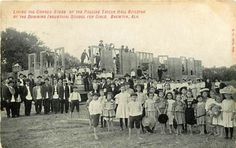
Our Triplets were bright and evergetic
Again, among the many of whom we are justly proud are the three little girls commonly known as “Our Triplets.” When quite young they were bereft of both father and mother and were placed in our school. Since then they have been supported by one man whose liberality has continued to this good hour. They are bright, energetic, and happy. As I know the tender care and protection they enjoy, I am sure if disembodied spirits are permitted to look with interest on the things of earth, their mother must look down with pleasure at the training and care they receive.
I have been many nights tossing from pillow to post trying to rest when the sweet angel of sleep had ceased to caress me into slumber. I have lived many a day when there was no sunshine in my soul, gone many a path where no flower bloomed, passed through many experiences with never a song to chase away the gloom. There have been times when my nerves seemed so many batteries charged with electrivcity (sic) beyond their capacity and each seemed a pathway for every lightning flash of thought, and the storms have grown terrible at times. Once when la grippe had such a hold on me, my very constitution seemed to be undermined, so much so I strongly contemplated giving up the work entirely.
Sometimes I rejoice, sometimes I weep
My experience has been a very varied one. Wild anziety, (sic) like the internal fires of a volcano, swept me into cvarious (sic) altitudes, so that at times there were deep depressions of mind, and my nervous tension would distress me like a nightmare. At other times the vinson (sic) would be all glorious and optimism has made every one a philanthropist.
Sometimes rejoicing, sometimes weeping; now with a toweing (sic) faith and again doubting; sometimes succeeding and then failing; sometime encouraged and at others ready to give up; sometimes victorious, at others miserbly (sic)defeated. Sometimes great gifts would come at an unlooked – for time, and then for long, weary seasons nobody would give. Often, oh! so often, I have said, “What shall I do next?” “Say ‘amen’ and sit down” is what the word says, but it does not suit in this case.
Facing the time when He should tread the wine press alone, yea, when the shadows of the cross were over Him, Jesus said to the disciples, “Behold, the hour cometh, yea is now come, that ye shall be scattered every man to his own, and shall leave me alone; and yet I am not alone, for the Father is with me.”
At a most fearful crisis David said: “I looked on my right hand and beheld, but there was no man that would know me; refuge failed me; no man cared for my soul. I cried unto Thee, O Lord, I said Thou art my refuge.”
Every one has his Gethsemane, and while there may be sympathy, there is the cup for wach (sic) to drink, the fearful lonliness, (sic) the battle fierce, peculiar to the individual, and it is his and no one else can know. Each should know the joy of “The Lord is my refuge” as truly as did the Psalmist.
I am responsible for it all
So this school experience has been mine. With all deference due my faithful friends, and they have been many, I am responsible for it all. If it ever grows to great proportions I may have honor more than I am in anywise worthy of. If it goes down in failure I shall bear all the blame. I am responsible for its growth, for every building, all furniture and equipment. The trustees have been exceedingly liberal to grant nearly everything I have asked, vote for any building, change, campaign to raise funds or salaries, with the understanding that the whole thing rested with me.
Twice I was forced to ask for a raise of salary and it was granted–provided I could get it. The salary of all teachers was always granted–provided I could get it for them. Nobody was responsible for anything except myself. Oh, so many times I have felt that I could carry my burden no longer. Surely His grace has been magnifies in my behalf. Truly faith is the victory that overcometh–faith strong in the sunlight, but stronger in the dark. Oh! the longing of a human heart must be immortal. Why should a soul crave with such unyielding tenacity? Clouds of doubt, mountains of difficulty rise up.
Slow progress
There is such slow progress compared with the burning desire, and freezing indifference to my strongest appeals, and long delay of what sleepless nights when billows of anziety (sic) sweep their merciless waves over me. Why did I not give up Sometimes tortured nerves and fevered brain mixed with disappointment and disgust would cause me to long for Elijah’s angel to refresh me under my juniper tree. But when I was borne in thought to some secluded spot and could hear the wail of so many neglected ones, my strength took on its youthful vigor and I wa ready to walk out again into the open field and defy all obstacles in the name of Elijah’s God.
I have found great comfort among friends whose faith has never wavered whose confidence in the plan has been unshaken, and whose encouragement has been words fitly spoken and as refreshing as the morning dew. My painstaking, unselfish, and hard-working teachers have stood by me in the severest crises, and have been an exceedingly great comfort to me. Another source of comfort has been the many songs I have loved, among which are the following:
Lead Kindly Light
Abide With Me
Jesus, Lover of My Soul
Rock of Ages, Cleft for Me
Jesus, Saviour, Pilot Me
I Shall See The King Some Day
I Shall See Him Face to Face
Work still in infancy
While there is much more to be done, the work really is still in its infancy, the horizon is brightening to a golden dawn.
Often the door has seemed closed to me and when I have called for help there has been no adequate response, and I have said:”Does no one care?” Yes, the Judge of all earth will do right and His promises never fail my plea. Overshadowed with the almighty and undergirded (sic) with His everlasting arms, upon Him I rest my hope. I shall go forth in His strength and, like Samson, I shall break the fetters and walk out into the open daylight of liberty and into the fullness of life all reaiant (sic) with hope. For the light shineth in a dark place and soon it will be the dawning, and then the bright morning star. Oh! that my friends would this day help me to make it high noon in the calendar of my life work by giving the help I need.
Tenth year approached
The tenth year of the school’s life is fast coming to a close and it is beautiful to see the harmony of teachers and pup[ils in connection with the system which makes every pupil do her part with such accuracy. Rising at 6 in the morning, one section of girls cooks the breakfast, another milks the cows, and another attends to the poultry while others are arranging their rooms for the day. At 7 they march to breakfast, after which another section washes the dishes.
Now, the work is so scheduled and the various departments so arranged that the library, music, business, sewing, cooking, housekeeping, dairy and poultry work are all carried on in such a way that one does not conflict with the other. In the meantime games of tennis, basket ball, croquet, ect., are very much enjoyed. By vote of the girls a “hand-out” lunch is served at noon. Dinner comes at 5, study hall at 6:30, and retiring at 9:30. The same system is observed on Sunday as well for we have Sunday school at 9 in the morning, church service at 11, dinner at 1, quiet hour at 2:30, Y.W.C.A. at 6.
Such system, such influence and power find wonderful expression in the lives of the young women who stay long enough to catch the spirit and appreciate its value.
Great needs
At this stage we are confronted with some great needs, on account of which the work will be greatly retarded if we do not receive help from some source. We are in great need of two buildings for industrial purposes, infirmary department and Y.W.C.A services. Our greatest need at present is an adequate endowment. But I realize that I will be forced to give up the work before all my ideals are attained, and that soon another must take my place.
———————————————-
“Here’s a toast that I want to drink
To a fellow I’ll never know–
To a fellow who’s going to take my place
When it’s time for me to go.
I’ve wondered what kind of a man he’ll be,
And wished I could take his hand.
Just to whisper, ‘I wish you well, old man’
In a way he’d understand.
I’d like to give to him a warm hand clasp
When never a friend seemed near.
I’ve learned my knowledge by sheer hard work,
And wish I could pass it on
To the fellow who’ll come and take my place
Some day when I am gone.
Will he see all the sad mistaked (sic) I’ve made,
And note the battles lost?
Will he ever guess the tears they caused
Or the heart aches the’s cost?
Will he gaze through the failures and fruitless toil
To the underling plan
And catch a glimpse of the real intent
And heart of the vanquished man?
I dare to hope he may pursue some day,
When he toils as I have wrought,
And gain some strength for his weary task
From the battles I have fought.
Bit I’ve only the task itself to leave
With the cares for him to face,
And never a cheering word may speak
To the fellow who’ll take my place.
Then here’s to your health, old chap;
Drink as a bridegroom to his bride:
I leave an unfinished task to you,
But God knows how I tried.
I’ve dreamed my dreams a all men do,
But only a few came true,
And my prayer today is that all the dreams
May be realized by you.
And we’ll meet some day in the great Unknown–
Out in the realm of space;
You’ll know my clasp as I take your hand
And gaze into your tired face.
Then all our failures will be success
In the light of the new-found dawn–
So here’s”how” and health to the chap
Who’ll take my place when I am gone.”
*Mrs. Pennington notes:”Miss Martin was librarian of the public library in East Tallassee all the time I was growing up and had a
……..(notes cut off the bottom of page).”
Vinegar of the Four Thieves was a recipe that was known for its antibacterial, antiviral, antiseptic and antifungal properties for years. It was even used to cure the Bubonic Plague.
VINEGAR OF THE FOUR THIEVES: Recipes & curious tips from the past


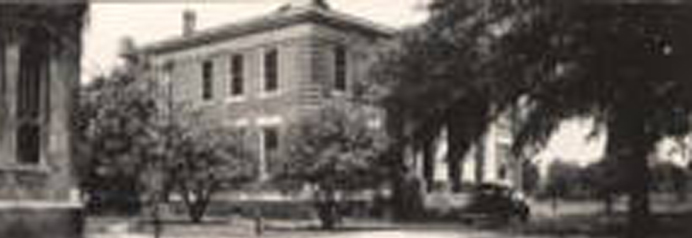
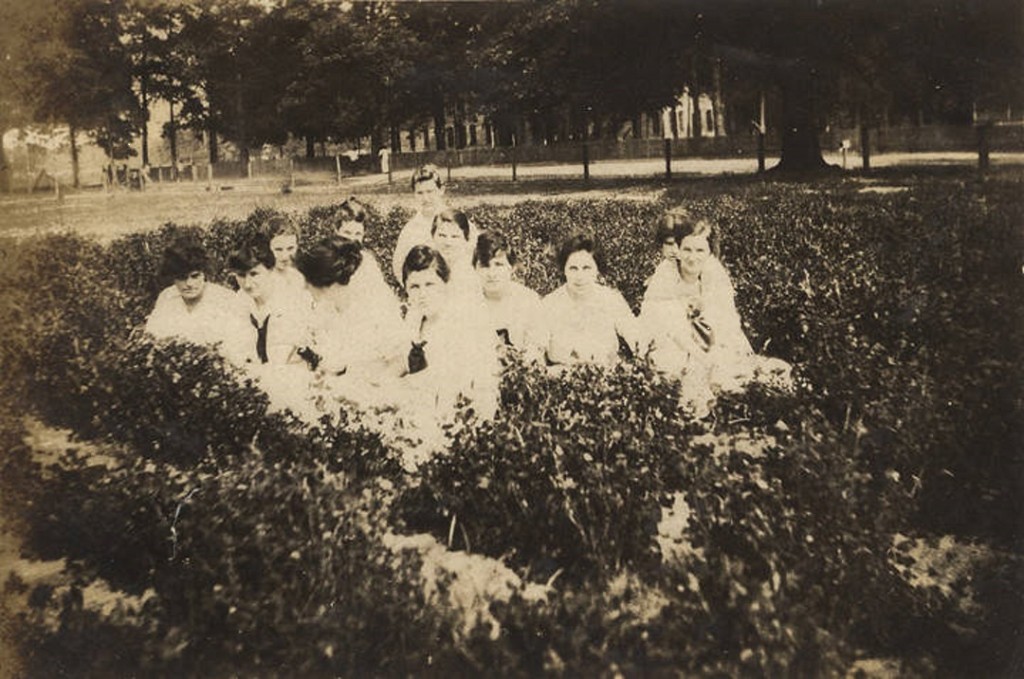
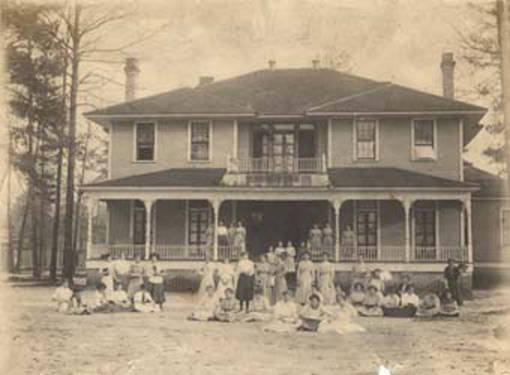
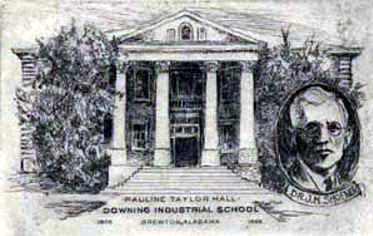
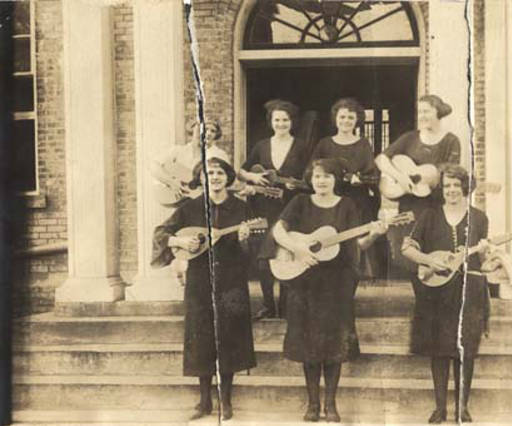
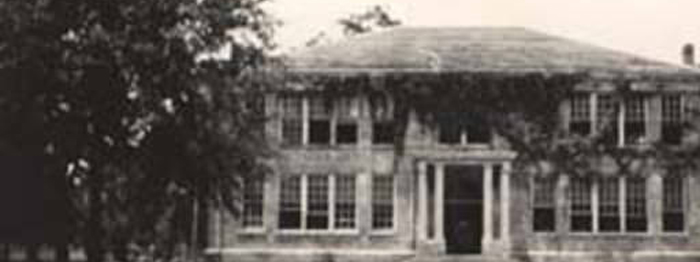
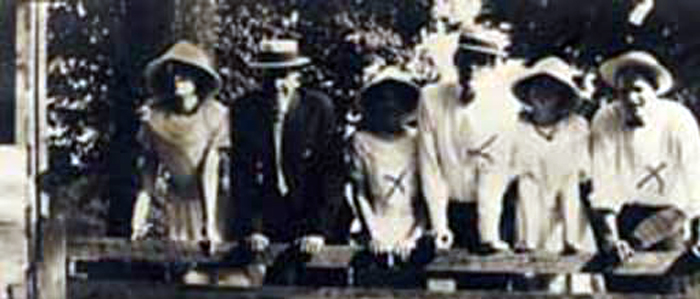
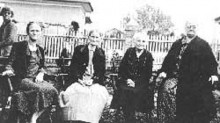
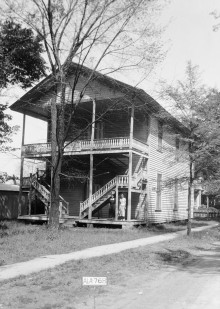

My Mother attended this school in the early 1900’s. I think this was like a high school for girls. She attended a one room school . I do not know what grades she finished nor what grades she finished at this school. Does anyone know?